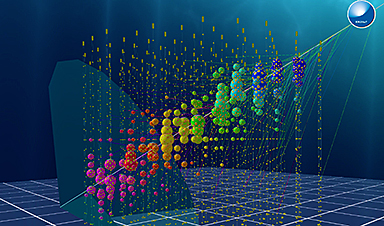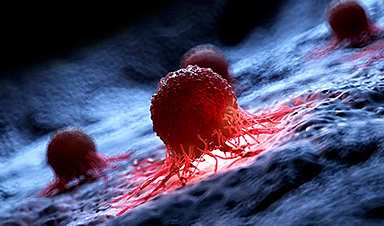Quantum gravity is the missing link between general relativity and quantum mechanics, the yet-to-be-discovered key to a unified theory capable of explaining both the infinitely large and the infinitely small. The solution to this puzzle might lie in the humble neutrino, an elementary particle with no electric charge and almost invisible, as it rarely interacts with matter, passing through everything on our planet without consequences.
For this very reason, neutrinos are difficult to detect. However, in rare cases, a neutrino can interact, for example, with water molecules at the bottom of the sea. The particles emitted in this interaction produce a “blue glow” known as Čerenkov radiation, detectable by instruments such as KM3NeT.
The KM3NeT (Kilometer Cube Neutrino Telescope) is a large underwater observatory designed to detect neutrinos through their interactions in water. It is divided into two detectors, one of which, ORCA (Oscillation Research with Cosmics in the Abyss), was used for this research. It is located off the coast of Toulon, France, at a depth of approximately 2,450 meters.
However, merely observing neutrinos is not enough to draw conclusions about the properties of quantum gravity—we must also look for signs of “decoherence.”
As they travel through space, neutrinos can “oscillate,” meaning they change identity—a phenomenon scientists refer to as flavor oscillations. Coherence is a fundamental property of these oscillations: a neutrino does not have a definite mass but exists as a quantum superposition of three different mass states. Coherence keeps this superposition well-defined, allowing the oscillations to occur regularly and predictably. However, quantum gravity effects could attenuate or even suppress these oscillations, a phenomenon known as “decoherence.”
“There are several theories of quantum gravity which somehow predict this effect because they say that the neutrino is not an isolated system. It can interact with the environment,” explains Nadja Lessing, a physicist at the Instituto de Física Corpuscular of the University of Valencia and corresponding author of this study, which includes contributions from hundreds of researchers worldwide.
“From the experimental point of view, we know the signal of this would be seeing neutrino oscillations suppressed.” This would happen because, during its journey to us—or more precisely, to the KM3NeT sensors at the bottom of the Mediterranean—the neutrino could interact with the environment in a way that alters or suppresses its oscillations.
However, in Lessing and colleagues’ study, the neutrinos analyzed by the KM3NeT/ORCA underwater detector showed no signs of decoherence, a result that provides valuable insights.
“This,” explains Lessing, “means that if quantum gravity alters neutrino oscillations, it does so with an intensity below the current sensitivity limits.” The study has established upper limits on the strength of this effect, which are now more stringent than those set by previous atmospheric neutrino experiments. It also provides indications for future research directions.
“Finding neutrino decoherence would be a big thing,” says Lessing. So far, no direct evidence of quantum gravity has ever been observed, which is why neutrino experiments are attracting increasing attention. “There has been a growing interest in this topic. People researching quantum gravity are just very interested in this because you probably couldn’t explain decoherence with something else.”
More information: Search for quantum decoherence in neutrino oscillations with six detection units of KM3NeT/ORCA, Journal of Cosmology and Astroparticle Physics (2025). On arXiv: DOI: 10.48550/arxiv.2410.01388
Journal information: arXiv
Provided by SISSA Medialab
News
A Grain of Brain, 523 Million Synapses, Most Complicated Neuroscience Experiment Ever Attempted
A team of over 150 scientists has achieved what once seemed impossible: a complete wiring and activity map of a tiny section of a mammalian brain. This feat, part of the MICrONS Project, rivals [...]
The Secret “Radar” Bacteria Use To Outsmart Their Enemies
A chemical radar allows bacteria to sense and eliminate predators. Investigating how microorganisms communicate deepens our understanding of the complex ecological interactions that shape our environment is an area of key focus for the [...]
Psychologists explore ethical issues associated with human-AI relationships
It's becoming increasingly commonplace for people to develop intimate, long-term relationships with artificial intelligence (AI) technologies. At their extreme, people have "married" their AI companions in non-legally binding ceremonies, and at least two people [...]
When You Lose Weight, Where Does It Actually Go?
Most health professionals lack a clear understanding of how body fat is lost, often subscribing to misconceptions like fat converting to energy or muscle. The truth is, fat is actually broken down into carbon [...]
How Everyday Plastics Quietly Turn Into DNA-Damaging Nanoparticles
The same unique structure that makes plastic so versatile also makes it susceptible to breaking down into harmful micro- and nanoscale particles. The world is saturated with trillions of microscopic and nanoscopic plastic particles, some smaller [...]
AI Outperforms Physicians in Real-World Urgent Care Decisions, Study Finds
The study, conducted at the virtual urgent care clinic Cedars-Sinai Connect in LA, compared recommendations given in about 500 visits of adult patients with relatively common symptoms – respiratory, urinary, eye, vaginal and dental. [...]
Challenging the Big Bang: A Multi-Singularity Origin for the Universe
In a study published in the journal Classical and Quantum Gravity, Dr. Richard Lieu, a physics professor at The University of Alabama in Huntsville (UAH), which is a part of The University of Alabama System, suggests that [...]
New drug restores vision by regenerating retinal nerves
Vision is one of the most crucial human senses, yet over 300 million people worldwide are at risk of vision loss due to various retinal diseases. While recent advancements in retinal disease treatments have [...]
Shingles vaccine cuts dementia risk by 20%, new study shows
A shingles shot may do more than prevent rash — it could help shield the aging brain from dementia, according to a landmark study using real-world data from the UK. A routine vaccine could [...]
AI Predicts Sudden Cardiac Arrest Days Before It Strikes
AI can now predict deadly heart arrhythmias up to two weeks in advance, potentially transforming cardiac care. Artificial intelligence could play a key role in preventing many cases of sudden cardiac death, according to [...]
NanoApps Medical is a Top 20 Feedspot Nanotech Blog
There is an ocean of Nanotechnology news published every day. Feedspot saves us a lot of time and we recommend it. We have been using it since 2018. Feedspot is a freemium online RSS [...]
This Startup Says It Can Clean Your Blood of Microplastics
This is a non-exhaustive list of places microplastics have been found: Mount Everest, the Mariana Trench, Antarctic snow, clouds, plankton, turtles, whales, cattle, birds, tap water, beer, salt, human placentas, semen, breast milk, feces, testicles, [...]
New Blood Test Detects Alzheimer’s and Tracks Its Progression With 92% Accuracy
The new test could help identify which patients are most likely to benefit from new Alzheimer’s drugs. A newly developed blood test for Alzheimer’s disease not only helps confirm the presence of the condition but also [...]
The CDC buried a measles forecast that stressed the need for vaccinations
This story was originally published on ProPublica, a nonprofit newsroom that investigates abuses of power. Sign up to receive our biggest stories as soon as they’re published. ProPublica — Leaders at the Centers for Disease Control and Prevention [...]
Light-Driven Plasmonic Microrobots for Nanoparticle Manipulation
A recent study published in Nature Communications presents a new microrobotic platform designed to improve the precision and versatility of nanoparticle manipulation using light. Led by Jin Qin and colleagues, the research addresses limitations in traditional [...]
Cancer’s “Master Switch” Blocked for Good in Landmark Study
Researchers discovered peptides that permanently block a key cancer protein once thought untreatable, using a new screening method to test their effectiveness inside cells. For the first time, scientists have identified promising drug candidates [...]





















